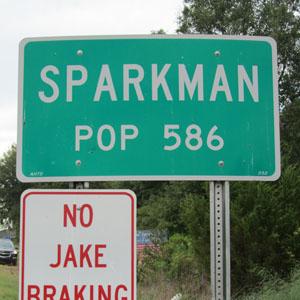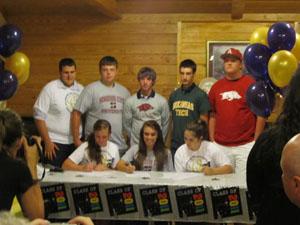
The tiny timber town of Sparkman, Arkansas, has lost more than half its population since 1950. If the current trend continues, the 500-resident community might disappear altogether.
But Sparkman residents have a plan to keep their hometown alive.
Stephanie Harmon was born in Sparkman, Arkansas 27 years ago.
"It's always been a part of me". "I love this town."
Except for the six years she spent getting her master's degree in education in a neighboring city, Harmon has always lived in Sparkman.

"It's a very intimate and close-knit town, almost like a one big family". "Everyone knows everybody and we all take care of each other in different ways."
She is now married to another Sparkman native and teaches in the town's only elementary school.
"We want to do anything to educate our students". "So it's disheartening to hear students wanting to leave the town."
High school graduates have to go away to continue their education, she explains, since there's no college in town. But many of them find better job opportunities in big cities, and never come back. So Harmon and others decided to do something to encourage students to go to college and return.
"We got together, several of us community members, and started this Sparkman Scholarship Foundation."
The idea is not entirely new. Many communities in Arkansas and across the country offer students money to pay for their higher education. However, Harmon says the Sparkman scholarship is unique.
"Most scholarships such as ours are funded through wealthy benefactors or corporations or other foundations". "Our scholarship has a uniqueness that really tells how wonderful our community is. We didn't have a wealthy benefactor or foundation who is funding us. Our scholarship is completely funded by the residents of Sparkman and others with a heart for our town."
One of those funders is Bill Sorrells, a retired grocery store owner who has lived in Sparkman for almost all his life. Although he doesn't have kids of his own, Sorrells donated $500 to the scholarship fund.
"I plan to donate more each year, not just one time". "It's our kids. If we don't help them, nobody else is going to help them. We hope these scholarships will encourage people to stay here and maybe even some people move here and help us to grow a little bit."
As a condition of accepting the money, students agree to return to Sparkman after graduation, and live and work in town.

For Renee Brown, who has two young daughters, the scholarship program is a winning enterprise for everyone.
"One person can fund a scholarship program alone", "but if everybody pools together, we can give, but still not have to give as much as we would if we had to pay for our children to go to college alone."
Brenda Garrett, a member of the Sparkman scholarship fundation, says since its launch last March, they've raised more than $56,000, 42,000 of that in just three months. She credits town's people's kindness generosity for that success.
"We had people call after they saw articles in newspapers". "Though they had been away from Sparkman for a long time, they saw the story and connected and made a donation and let us know that they appreciated what we're doing for their hometown."
Four of Sparkman's 12 high school graduates won a scholarship last summer, including Garrett's son Sam. He's now studying mechanical engineering at Arkansas Technical University in nearby Russellville.
"I'm planning on going back after I get out of the college". "Maybe me staying around would encourage a lot of peers to stay around too."
Sparkman is not the only small town facing a shrinking population.
"The United States, as a whole, is growing at a very rapid pace so the population growth is not the problem". "The problem is that population growth in the US is extremely uneven," Mark Mather, a demographer at the Population Reference Bureau. "It's estimated that about 16 percent of the United States population lives in counties that are classified as non-metropolitan or rural counties. The number has dropped every decade for the past 100 years."
Those who live in small towns and rural areas point to the benefits. It's less stressful and cheaper than living in metropolitan areas. However, one of the primary reasons people move away is the lack of job opportunities.
"When conditions get that bad", "you end up in this vicious circle where new employers don't want to move in because there is not many people living there and no one wants to move there because there aren't any jobs."
The key to survival for these communities is job creation. Sparkman's Stephanie Harmon says that's the goal of their scholarship program - to ensure their town survives and thrives.
New young artists honored with awards from Scholastic Corporation
Top student shuns studies for prayers
(來(lái)源:VOA 編輯:張若瓊)
